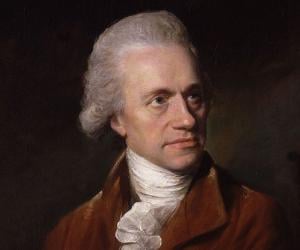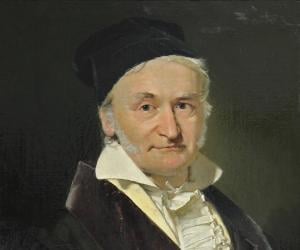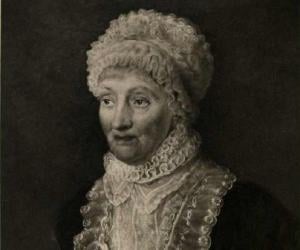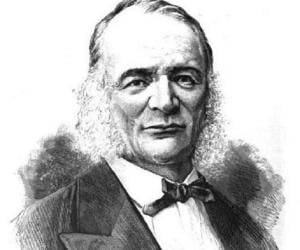This 17th-century German mathematician, astronomer, and astrologer is remembered for his pathbreaking work on optics. He invented a developed version of the refracting telescope. He also laid down Kepler's laws of planetary motion and wrote Astronomia Nova, Harmonices Mundi, and Epitome Astronomiae Copernicanae.
William Herschel was a German-born British astronomer and composer. He pioneered the use of astronomical spectrophotometry and discovered infrared radiation. Impressed by his work, King George III appointed him the Court Astronomer. Herschel often collaborated with his sister, Caroline Lucretia Herschel, a fellow astronomer. In 1816, he was made a Knight of the Royal Guelphic Order.
German mathematician and physicist Carl Friedrich Gauss is remembered for his work in math and science. Known as the Princeps mathematicorum, he laid down tenets such as the Gauss's Law. He had exhibited his talent since an early age and had completed writing Disquisitiones Arithmeticae by 21.
Caroline Herschel was a German astronomer who is credited with the discovery of many comets, such as 35P/Herschel-Rigollet, which is named in her honor. In 1828, Herschel became the first woman to be honored with a Gold Medal of the Royal Astronomical Society. She was also the first female scientist to receive a salary.
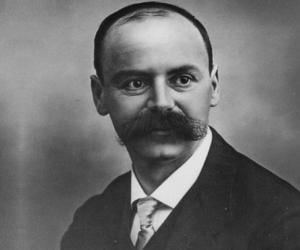
Karl Schwarzschild was a German astronomer and physicist. He is remembered for his contributions to the general theory of relativity; Schwarzschild came up with the first exact solution to the Albert Einstein field equations. He also contributed immensely to the theory of black holes.

Johann Georg Faust was an astrologer, magician, and itinerant alchemist of the German Renaissance. Faust is the subject of a local folk legend which claims that Johann Georg Faust managed to make a deal with the devil. His story was adapted by Christopher Marlowe in his 1604 Elizabethan tragedy, The Tragical History of the Life and Death of Doctor Faustus.
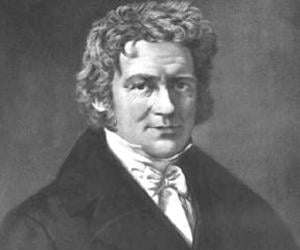
Friedrich Bessel was a German mathematician, astronomer, geodesist, and physicist. He was the first astronomer to use the method of parallax in order to determine the distance of a star from the sun. Bessel was a much-respected figure during his time. He was honored with the Gold Medal of the Royal Astronomical Society.
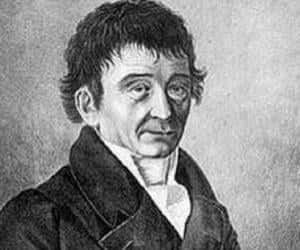
Ernst Chladni was a German musician and physicist. He is often referred to as the father of acoustics for his research on vibrating plates; he came up with a method to observe and study the various modes of vibration. Ernst Chladni is also considered the father of meteoritics for his significant contribution to the study of meteorites.
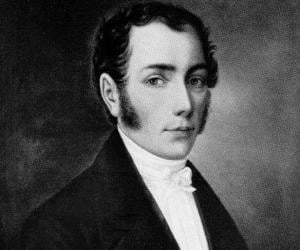
Joseph von Fraunhofer was a Bavarian optical lens manufacturer and physicist. He is credited with developing diffraction grating and inventing the spectroscope. He is also credited with discovering the Fraunhofer lines, the dark absorption lines produced in the spectrum of the sun. The Fraunhofer Society, Europe's biggest Society for the Advancement of Applied Research, is named in his honor.
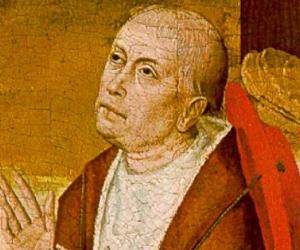
Nicholas of Cusa was a German mathematician, astronomer, jurist, theologian, and philosopher. One of the first supporters of Renaissance humanism in Germany, Nicholas of Cusa made significant political and spiritual contributions in European history. He is remembered for his efforts to reform the universal and Roman Church.
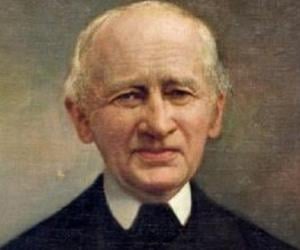
Johann Gottfried Galle was a German astronomer who worked at the Berlin Observatory. On 23 September 1846, he became the first person to view and recognize the planet Neptune. The discovery of Neptune is considered one of the most significant moments of 19th-century science and is widely regarded as a validation of celestial mechanics.
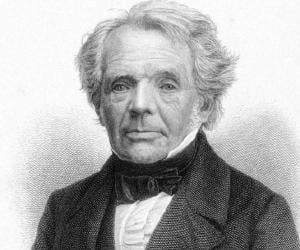
August Ferdinand Möbius was a German theoretical astronomer and mathematician. He is best remembered for his discovery of the Möbius strip, the simplest non-orientable surface. He is also remembered for introducing the Barycentric coordinate system. Several mathematical concepts like the Möbius transformations and the Möbius plane are named in his honor.
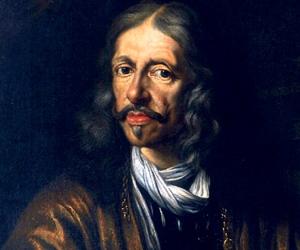
Johannes Hevelius was an astronomer who is credited with describing 10 new constellations; seven of ten constellations described by him are used by astronomers today. He is also referred to as the founder of lunar topography for making a compilation of an atlas of the moon. He is also credited with making a comprehensive catalog of 1,564 stars.
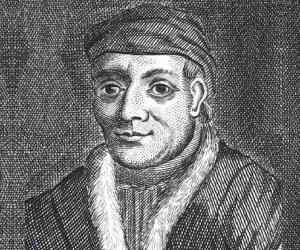
Regiomontanus was an astrologer, astronomer, and mathematician of the German Renaissance. The development of Copernican heliocentrism was possible because of Regiomontanus' significant contributions to the field of astronomy. Regiomontanus is also credited with designing his own astrological house system which went on to become one of the most famous systems in Europe.
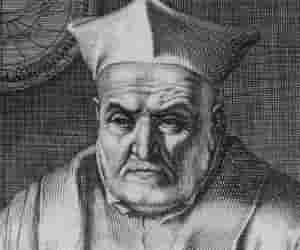
Christopher Clavius was a Jesuit German astronomer and mathematician. Clavius was one of the members of the Vatican commission that gave a green signal to Aloysius Lilius' calendar which came to be known as the Gregorian calendar. He was one of Europe's most respected astronomers; his books were used for over 50 years for astronomical education in and around Europe.
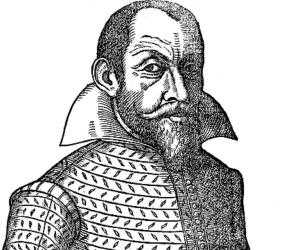
Simon Marius was a German astronomer who was one of the first observers of Jupiter's four largest moons. He was charged with plagiarism for publishing his discovery. He is now credited with naming the moons of Jupiter. Simon Marius is also remembered for being Galileo Galilei's one of foremost rivals.
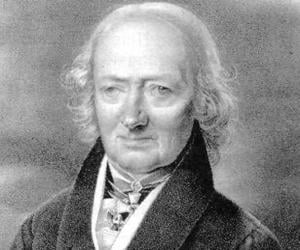
Johann Bode was a German astronomer best remembered for popularizing the Titius–Bode law. He is also credited with determining the orbit of planet Uranus and also suggested the name Uranus. He also served as the director of the Berlin Observatory.

Harald Lesch is a German astronomer, physicist, author, and natural philosopher. He serves as a professor of physics at the LMU and teaches natural philosophy at the Munich University of Philosophy. He is credited with educating complex physical or philosophical issues to public with the help of his television programs. He is the recipient of the Hanns Joachim Friedrichs Award.
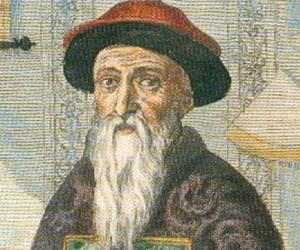
Johann Adam Schall von Bell was a German astronomer and Jesuit missionary. Schall von Bell, who spent most of his life doing missionary work in China, played an important role in Chinese history as he was one of the most important advisers to the Shunzhi Emperor. He is also credited with educating the Chinese on the concepts of Western astronomy.
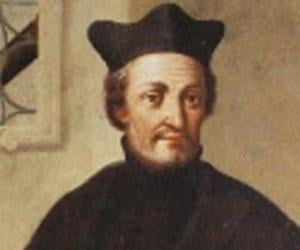
Christoph Scheiner was a Jesuit priest, astronomer, and physicist. He is credited with inventing the pantograph which he demonstrated in Munich after he was invited by Duke William V of Bavaria. Several schools and streets in Germany are named after him. A lunar crater is also named in his honor.
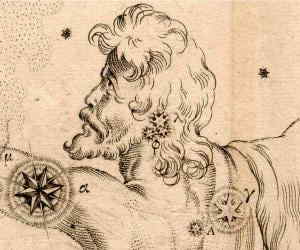
Johann Bayer was a German uranographer and lawyer. He is best remembered for gauging the positions of several objects on the celestial sphere. His book Uranometria, which was published in 1603, publicized a system of identifying stars that are visible to the naked eye. The moon’s crater Bayer is named so in his honor.

Born to a doctor father, German astronomer Max Wolf had an observatory in his backyard, as a child. He is best remembered for pioneering astrophotography and for discovering comets. He was also the first to use the stereocomparator, which helps locate motion in celestial photos.
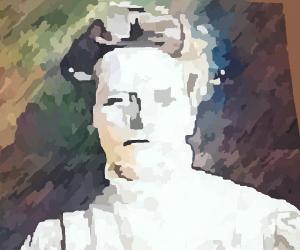
Born to a Lutheran minister, Maria Margaretha Kirch was educated at par with boys of her age, which wasn’t the norm back then. She later became the first woman astronomer to discover a comet. The German astronomer also received accolades such as the Gold Medal of the Royal Academy of Sciences.
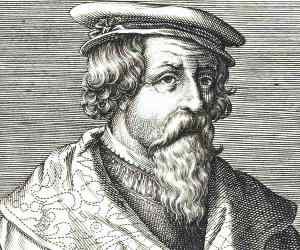
Petrus Apianus was a German humanist whose published works pertaining to geography and astronomy are considered one of the most important works of his time. His works, such as Cosmographicus liber (1524) and Astronomicum Caesareum (1540), which were translated into several languages were being published even after his death.
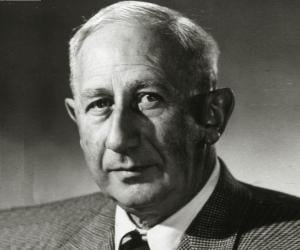
Born to a schoolteacher in Germany, Walter Baade began his career at the Hamburg Observatory and made minor celestial discoveries. He later moved to the U.S. in search of better astronomical technology. He also discovered population I and population II stellar types and, along with Fritz Zwicky, coined the word supernova.

Part of the legendary Struve family of astronomers, Friedrich Georg Wilhelm von Struve is best remembered for his research on double stars, or binary stars. The winner of the Gold Medal of the Royal Astronomical Society, Struve had fled Germany and moved to Denmark and to Russia, to avoid military service.
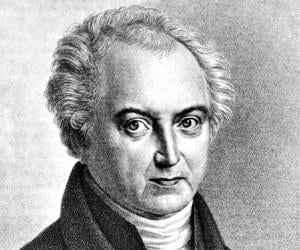
Apart from being an astronomer, Heinrich Wilhelm Olbers was also a qualified physician. He converted a portion of his house into an observatory and spent a considerable part of his life attempting to discover a planet between Jupiter and Mars. He is best known for introducing his idea of Olbers' paradox.
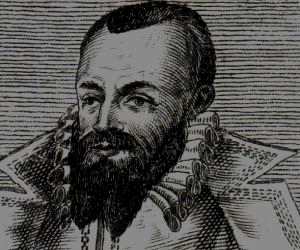
Once a Lutheran pastor, Michael Maestlin later became one of the greatest astronomers from Germany. He was one of the first to teach the heliocentric Copernican theory and later became famous as the mentor of Johannes Kepler. He was also apparently the first to measure the orbit of a comet.
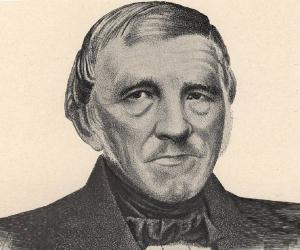
German astronomer Johann Franz Encke was born into poverty but managed to continue his studies with the help of financial aid from his teacher. He is best remembered for determining the period of the 2P/Encke, or Encke’s Comet. He also discovered the outermost of Saturn’s rings, the Encke’s Division.

Radboud University professor Heino Falcke is best known for his research on black holes and cosmic rays. He co-developed the Low Frequency Array radio interferometer and expressed his desire to get it installed on the Moon. The Spinoza Award-winning Dutch astrophysicist is also a pastor at a Protestant church.
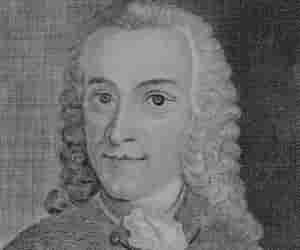
Tobias Mayer is best remembered for his extensive research on the Moon and lunar tables, which revolutionized the study of longitude at sea. Born amid poverty, he taught himself math and began his career as a math teacher. He eventually chaired economy and math at the University of Göttingen.
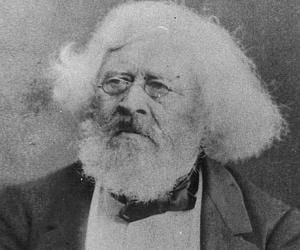
Born to a goldsmith, Peter Andreas Hansen had initially learned the art of watchmaking. However, his skills as an astronomer eventually earned him the post of the director of the Seeberg Observatory near Gotha. His best-known works are related to optics, probability theory, and the motion of the Moon.
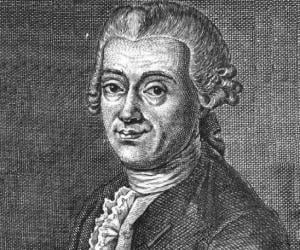
Johann Daniel Titius, best known for proposing the Titius–Bode law, was a pioneer in measuring distances between the Sun and celestial bodies and planets. There is a crater on the Moon that is named after him. His areas of research also included thermometry and biology.

Friedrich Wilhelm Argelander is best remembered for his research on variable stars. He served as the director of the Åbo Observatory in Finland and also released his legendary star catalogue Bonn Survey. He is also credited with establishing the Astronomical Society and won the Gold Medal of the Royal Astronomical Society.
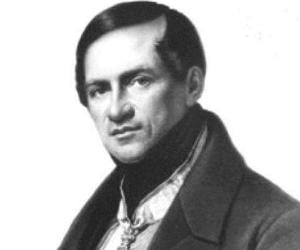
Apart from being an astronomer, Wilhelm Beer was also a banker and the brother of legendary composer Giacomo Meyerbeer. His Mappa Selenographica, was the first lunar map that was classified into quadrants. Along with Johann Heinrich Mädler, he also created the first globe for Mars.

Born in Schleswig (then Denmark), Christian Heinrich Friedrich Peters later moved to Italy and then the Ottoman Empire, and eventually migrated to the U.S. Best known for his discovery of asteroids, he was a Royal Astronomical Society member and also taught at New York’s Hamilton College.
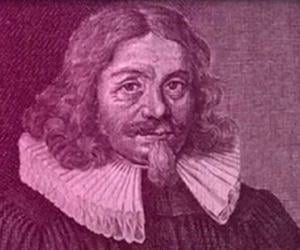
Dutch astronomer Johannes Fabricius is credited with being the first to observe sunspots and to write about them. He also finds mention in Jules Verne's From the Earth to the Moon. Along with his father, astronomer David Fabricius, he used a camera obscura for their celestial explorations.
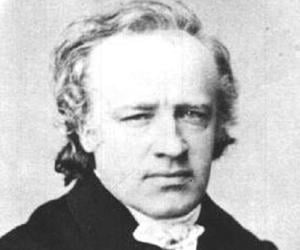
German astronomer Heinrich Louis d’Arrest is best remembered for hastening the discovery of Planet Neptune by suggesting the use an unpublished star chart, Hora XXI of the Berliner Akademische Sternkarten, while assisting Johann Gottfried Galle at Berlin Observatory. Known for his meticulous investigation he later discovered d'Arrest's Comet, 76 Freia, nebulae and two spiral galaxies called NGC1 and NGC 26.

Karl Ludwig Harding is best remembered for discovering the asteroid or minor planet Juno. The University of Göttingen alumnus later taught at his alma. He catalogued over 120,000 stars in his iconic book Atlas novus coelestis. He was also made a Fellow of The Royal Society.
Born in Russia, Otto Wilhelm von Struve was too young to join a university when he had completed his studies at the gymnasium and thus initially joined as a listener. He often assisted his astronomer father Frederich von Struve and later discovered about 500 double stars and studied Saturn’s rings.

German physicist Carl August von Steinheil is best remembered for his pioneering work in optics, photometry, and telegraphy. His ideas gave rise to new designs in telegraphic receivers which in turn decreased the cost of telegraphic lines to a great extent. He also contributed as a teacher, teaching mathematics and physics at Munich University.
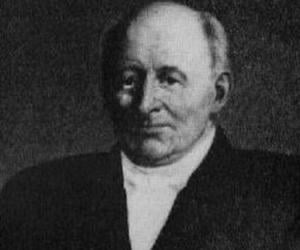
Initially an apothecary, Heinrich Schwabe later gained fame as an astronomer and studied sunspots. He was also the first to draw Jupiter’s Great Red Spot. He was made a Foreign Member of the Royal Society and also won the Gold Medal of the Royal Astronomical Society.

Orphaned at 19, he Johann Heinrich von Mädler initially taught to earn a living. Best known for his map of the Moon, Mappa Selenographica, which he co-created with Wilhelm Beer, he later served as the director of the Dorpat Observatory. He also studied double stars and held lectures on astronomy.
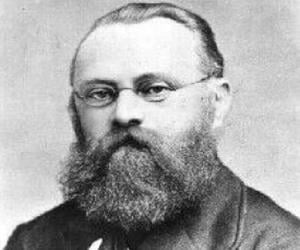
Ernst Wilhelm Leberecht Tempel was a German astronomer known for his discovery or co-discovery of numerous comets, including Comet 55P/Tempel-Tuttle. He worked in Marseille for many years before moving to Italy after the outbreak of the Franco-Prussian War. He received the Lalande Prize in 1861 and the Prix Valz in 1880. The main-belt asteroid 3808 Tempel is named after him.
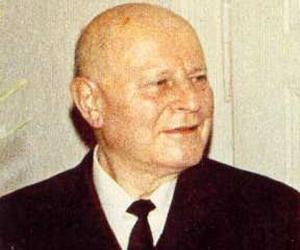
German astronomer and mineralogist Karl Wilhelm Reinmuth is credited with the discovery of 395 minor planets. His best-known discovery was the 69230 Hermes, which was assumed lost for over 50 years before being discovered again. He was associated with the Heidelberg Observatory for most of his life.
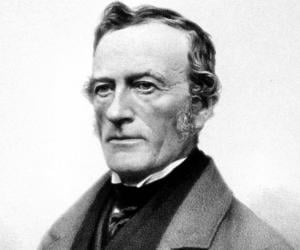
Although Johann von Lamont is best known for discovering that the Earth’s magnetic field fluctuates with a period of around 10 years, his contributions towards astronomy is not limited to that. Known to catalogue more than 34,000 stars, he also determined the mass of Uranus, orbits of Saturn’s satellites Enceladus and Tethys and periods of Uranus’ satellites, Ariel and Titan.
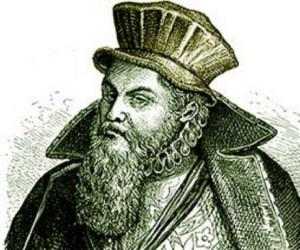
German mathematician, astronomer, poet, and Renaissance humanist Philipp Nikodemus Frischlin began his career as a professor of poetry and history and later studied the works of Virgil. He was later arrested for defamation and imprisoned at a fortress. He fell to his death while trying to escape his cell.
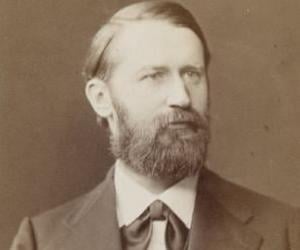
Arthur von Auwers is best remembered for his star catalogs and his research on double stars. He began his career with the Gotha Observatory and ended up being part of the French Académie des Sciences. He was the father of renowned German chemist Karl von Auwers, who discovered the Auwers synthesis.

Thirteenth-century rabbi and mystic Eleazar of Worms is best known for his copious works such as Sefer Ḥasidim, which offer detailed accounts of the Hasidei Ashkenaz movement of German Jews. His work on Jewish ethics, Ha-Roḳeaḥ, or The Perfumer, earned him the nickname Eleazar Rokeaḥ.
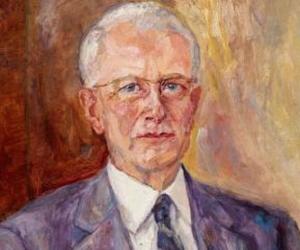
Otto Heckmann, who was the director of both the Hamburg Observatory and the European Southern Observatory, was also a Nazi Party member. Known for his research on statistical mechanics, relativity, and cosmology, he was instrumental in the creation of the AGK3 catalog. The 1650 Heckmann asteroid was named in his honor.

